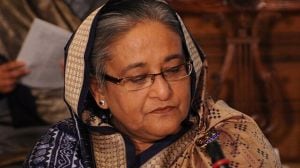Hurriyat one voice on Waqf speech ban
At a time when the split among separatists is etched in stone, Hurriyat hardliner Syed Ali Shah Geelani and moderate Mirwaiz Umar Farooq hav...

At a time when the split among separatists is etched in stone, Hurriyat hardliner Syed Ali Shah Geelani and moderate Mirwaiz Umar Farooq have found an issue on which they seem to be in total agreement.
Both are vehemently opposing a ban on political speeches in mosques and shrines run by the government-regulated J-K Waqf Board. Their arguments, and language used to denounce the ban, sounded very similar.
The two separatist leaders —leading the hardline and moderate Hurriyat camps— in their addresses to the respective Friday congregations, the first after the ban, saw it as a ‘‘ploy to weaken the freedom struggle’’, and an ‘‘interference in religious affairs’’.
‘‘Politics and religion in Islam cannot be separated,’’ said Geelani. ‘‘Secular speeches by secular men are not allowed at Muslim religious places,’’ Geelani claimed, alleging that the ban on political speeches in shrines and religious places went against the mission of the revered saints buried there, as ‘‘their mission was propagation of Islamic teachings’’.
Geelani spoke at a mosque in the heart of the city. Mirwaiz took up the issue at the Jamia Masjid. He said the general council Mutahida Majlis Ulema (United Forum of Ulemas) would soon meet to discuss the ban. Mirwaiz too said that there was no separation of politics from religion in Islam.
‘‘We are guided by the teachings of our beloved Prophet Mohammad in every field, be it politics or religion,’’ he said. Muslim religious places were centres for imparting teaching to Muslims, and ‘‘my religious position demands that I talk on every issue related to our lives and very bluntly,’’ he said. ‘‘Politics is as sacred as human lives… and honour.’’
Targeting the state’s mainstream political leaders, he said, ‘‘We won’t like them to exploit the sentiments of people for political interests.’’
In September 2003, the Peoples Democratic Party-led government divested the National Conference-run Muslim Auqaf Trust (MAT) of all its properties, and set up the J-K Waqf Board, which took control of shrines and mosques administered by MAT.
It now controls around 100 such religious places, including prominent shrines like Hazratbal, Charar-e-Sharief, Aishmuqam, and the Ziarat of Hazrat Makhdoom Sahib. Some equally important ones like Srinagar’s Jamia mosque, were still out of its purview.
Militants behead man
JAMMU: Militants on Friday decapitated a man of the Gujjar community and left his head wrapped in cloth with the warning ‘‘support security forces and face death’’ written on it in Udhampur district. Kaka Hussain, abducted by the militants on Thursday from Dachan village, was beheaded on Friday, sources said. — PTI



- 01
- 02
- 03
- 04
- 05




























